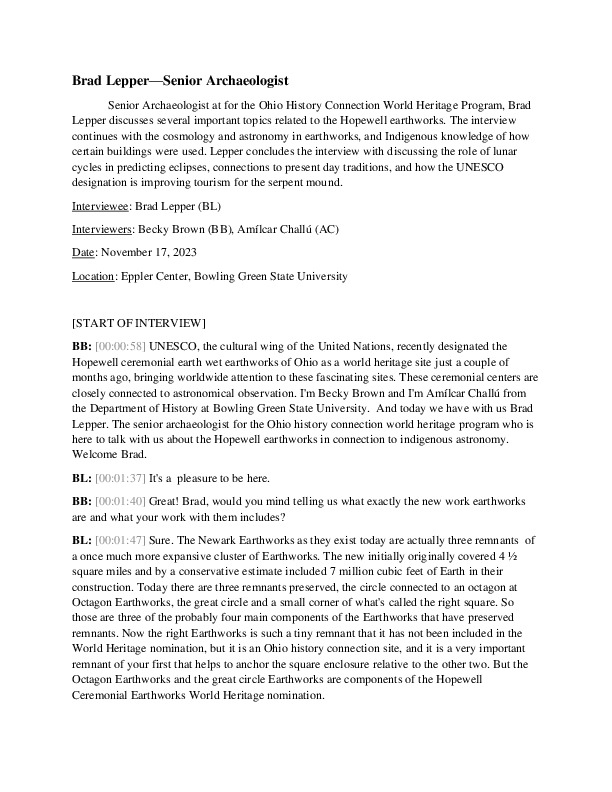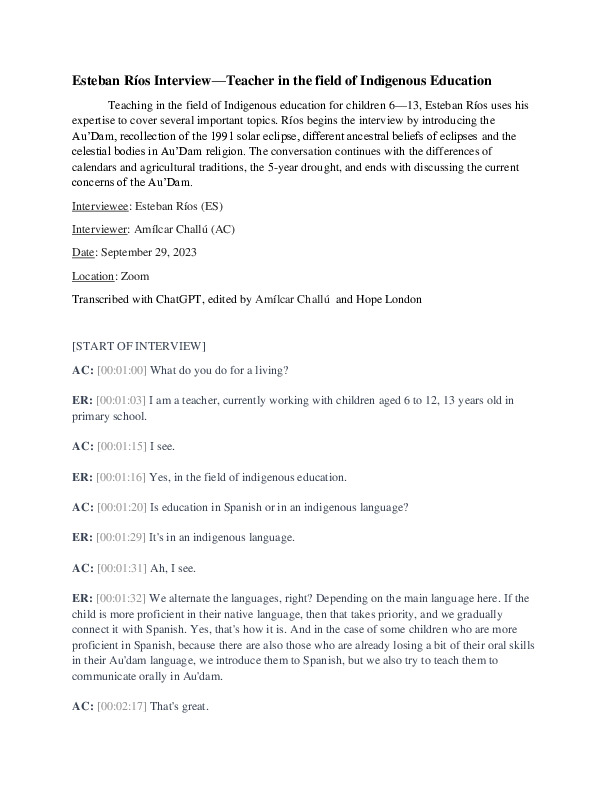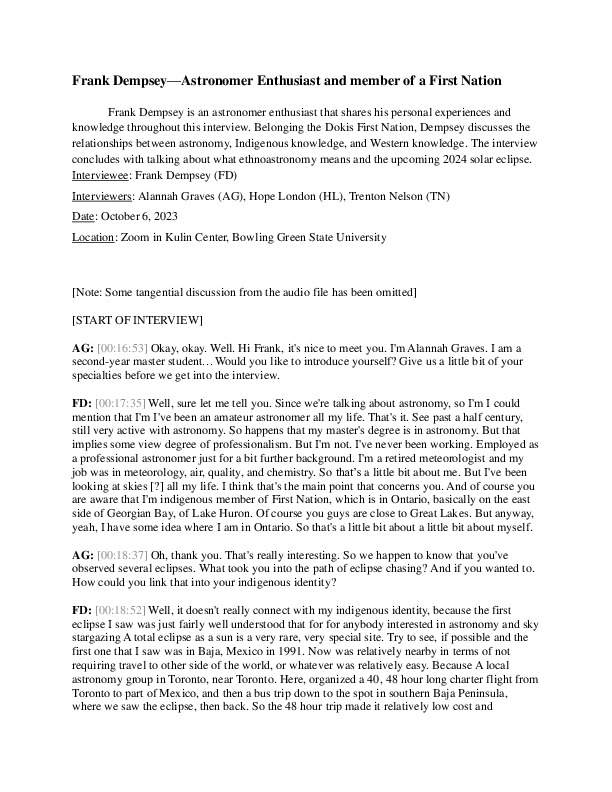Browse Items (34 total)
-
Celestial Shadow Dances
Teaching Professor Kate Dellenbusch kicks of the 2024 Eclipse Speaker Series with a talk about the phenomenology of eclipses. -
Episode 0: Welcome to Eclipsing History
Join Dr. Amílcar Challú and Dr. Cheryl X. Dong as they discuss the concept of the podcast and its production. Initially conceived as a way to engage audiences about the historical significance of eclipses, this project quickly evolved to focus on the various Indigenous Nations of North America and explore eclipses from these diverse points of view. They demystify concepts like “ethnoastronomy” and “archaeoastronomy” while highlighting the ways that Indigenous Knowledge helped people navigate celestial events. This episode was created by Dr. Amílcar Challú and Dr. Cheryl X. Dong. Landon Cina from the BGSU College of Musical Arts provided the music and Midstory edited the final episodes. This podcast is made possible, in part, by Ohio Humanities and the National Endowment for the Humanities. Any views, findings, conclusions or recommendations expressed in this podcast do not necessarily represent those of Ohio Humanities or the National Endowment for the Humanities.
-
Episode 1: Total Eclipse of the Swamp
Episode 1 tells the story of the 1806 eclipse, the last solar eclipse to pass over the state of Ohio in almost 200 years. The eclipse held special significance to the Shawnee peoples because of the role that it played in galvanizing a religious and political movement led by Tenskwatawa and his brother, Tecumseh. This episode looks at the spiritual and cultural power of eclipses to influence the peoples who witness it. Its influence over the centuries is explored by students Sam Davis, Peter Limbert, and Joe DeSario with input from Dr. Amílcar Challú and Dr. Cheryl X. Dong. Landon Cina from the BGSU College of Musical Arts provided the music and Midstory edited the final episodes. This podcast is made possible, in part, by Ohio Humanities and the National Endowment for the Humanities. Any views, findings, conclusions or recommendations expressed in this podcast do not necessarily represent those of Ohio Humanities or the National Endowment for the Humanities. -
Episode 2: Eclipses and Power
Episode 2 explores the relationship between eclipses and the power that different peoples wielded through them. Eclipses played an important role in the formation of North American national identities, with different nations using their ability to predict eclipses as proof of scientific, cultural, and racial superiority. This episode blurs the line between magic, science, and religion; showing how all types of knowledge can be used to understand the underlying science of eclipses and help people navigate these experiences spiritually, physically, and emotionally. Eclipses are not just astronomical experiences, but they are also powerful tools that have been used to support military campaigns, political agendas, and different religions. This episode was created by Alex Eckhart, Magdalena Fuller, Timi Fatoki, and Nick Bowers with input from Dr. Amílcar Challú and Dr. Cheryl X. Dong. Landon Cina from the BGSU College of Musical Arts provided the music and Midstory edited the final episodes. This podcast is made possible, in part, by Ohio Humanities and the National Endowment for the Humanities. Any views, findings, conclusions or recommendations expressed in this podcast do not necessarily represent those of Ohio Humanities or the National Endowment for the Humanities. -
Episode 3: Written in the Stars
Episode 3 delves into the fields of ethnoastronomy and archaeoastronomy to explore how the Indigenous Nations of North America understood the stars from ancient times to the present. With a focus on the Mound Builders of Ohio, we explore the continuities of astronomical knowledge from past to present, interviewing both Tribal members and academic experts about how they see the connections between ancient and present peoples of North America. Finally, we highlight the astronomical traditions of the Myaamia, the Shawnee, the Au’Dam, and others, exploring their shared connections and crucial differences. This episode was created by Emily Shaver Kay, Bekah Shively, and Burkart with input from Dr. Amílcar Challú and Dr. Cheryl X. Dong. Landon Cina from the BGSU College of Musical Arts provided the music and Midstory edited the final episodes. This podcast is made possible, in part, by Ohio Humanities and the National Endowment for the Humanities. Any views, findings, conclusions or recommendations expressed in this podcast do not necessarily represent those of Ohio Humanities or the National Endowment for the Humanities. -
Episode 4: Chasing Dreams, Watching Shadows
Episode 4 delves into the tourist economy of eclipse watching from the past to the present, highlighting how ordinary people described these rare celestial experiences. It explores the intersection of amateur and professional astronomy, shining light on how the ability to predict eclipses accurately became essential to eclipse chasers, professional and amateur astronomers who travel the world for a glimpse of these astronomical phenomena. We then shift gears to think about modern eclipses. Starting with the economic impact of the 2017 eclipse, we interview representatives from various Ohio-based institutions who have big plans for the April 8, 2024 eclipse. Please check out Ohio.gov for an interactive map of eclipse events all across the Buckeye state! This episode was created by Ernest Okine, Paige Pazstor, and Nico Hartzell with input from Dr. Amílcar Challú and Dr. Cheryl X. Dong. Landon Cina from the BGSU College of Musical Arts provided the music and Midstory edited the final episodes. This podcast is made possible, in part, by Ohio Humanities and the National Endowment for the Humanities. Any views, findings, conclusions or recommendations expressed in this podcast do not necessarily represent those of Ohio Humanities or the National Endowment for the Humanities. -
Episode 5: Eclipsing Emotions
Episode 5 explores how various people and cultures experienced eclipses from an emotional perspective through time. Described by many as both sublime and eerie, eclipses provoke a range of emotional responses from awe to terror to wonder. Although we often think about emotions as universal human experiences, this episode explores how different cultures throughout history mediated these emotional experiences to help people make sense of the eclipse experience. Exploring everything from the experiences of the native Au’Dam people of Mexico to those of rural villagers in 1960s China, this episode asks, “how do we feel an eclipse"? This episode was created by Alannah Graves, Hope London, and Trenton Nelson with input from Dr. Amílcar Challú and Dr. Cheryl X. Dong. Landon Cina from the BGSU College of Musical Arts provided the music and Midstory edited the final episodes. This podcast is made possible, in part, by Ohio Humanities and the National Endowment for the Humanities. Any views, findings, conclusions or recommendations expressed in this podcast do not necessarily represent those of Ohio Humanities or the National Endowment for the Humanities.





